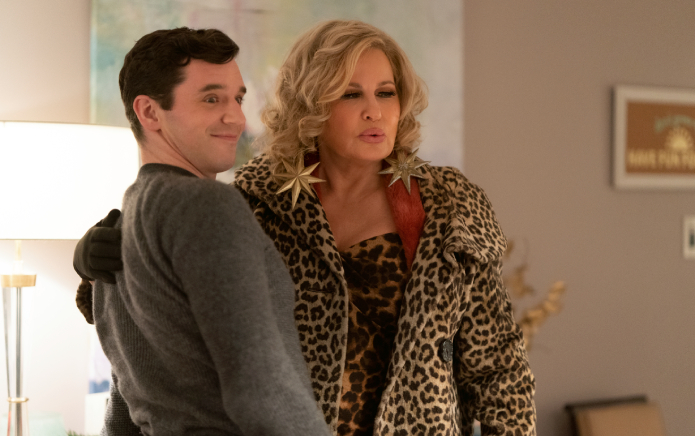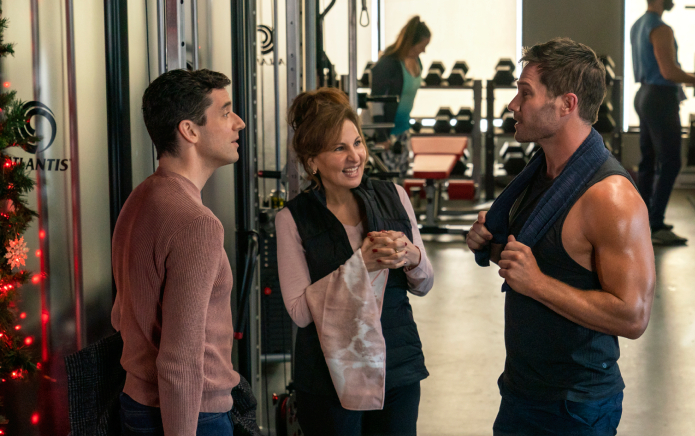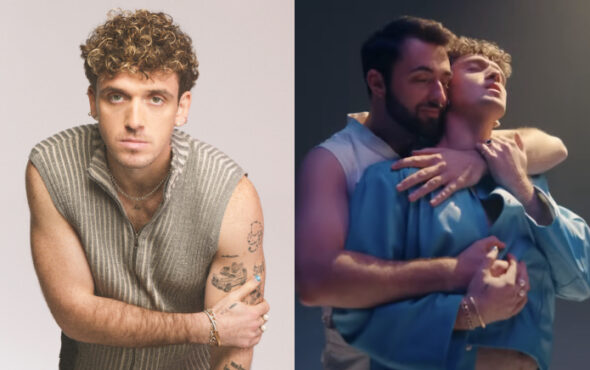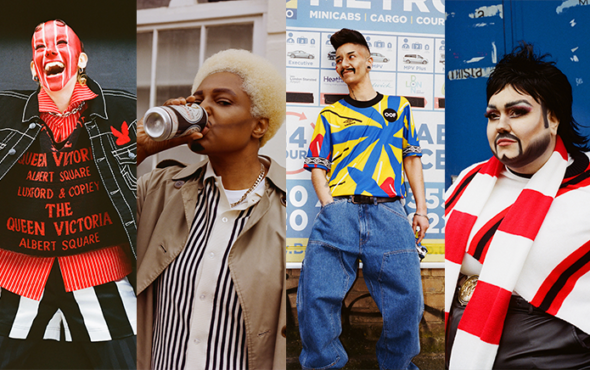Jennifer Coolidge and Kathy Najimy have opened up about their status as LGBTQ+ icons.
The legendary stars both appear in Single All The Way, which follows Peter (Michael Urie) as he persuades his best friend Nick (Philemon Chambers) to pose as his boyfriend on a trip home for Christmas to avoid his family’s judgement about his perpetual single status.
The rom-com made history as Netflix’s first ever holiday film centring on a gay romance.
Najimy co-stars as Peter’s mother, who sets him up on a blind date with her handsome spinning instructor (Luke Macfarlane), while Coolidge plays his kooky Aunt Sandy, a former New York actress producing and starring in a nativity play with Peter’s nieces and nephews.
Leading up to the film’s release (now available to stream on Netflix!), we spoke with Coolidge and Najimy about their relationship with the LGBTQ+ community and why queer fans have rallied behind both of their respective careers.
“Mine was very subconscious. Growing up I was a very unaware person, I wasn’t very observant,” Coolidge told GAY TIMES over Zoom. “You are so subconscious of your choices, you sort of just find yourself in a group or whatever and I just found I was always attracted to gay women and gay men.
“That was sort of my group and it was all subconscious. It was just what I liked, and I feel like maybe it eventually becomes a mutual thing where it’s like what you are attracted to somehow reverses itself and it’s mutual.”
The star added: “It’s always been what I’ve been into.”
Coolidge is best known for her roles as Paulette Bonafonté in the Legally Blonde film series (2001-2003) – which she will reprise in the upcoming second sequel – Fiona in A Cinderella Story (2004), Sophie in 2 Broke Girls (2011-2017) and as a regular in Christopher Guest’s mockumentary films.

More recently, Coolidge received widespread critical acclaim for her role as Tanya McQuoid in the first season of HBO’s anthology series The White Lotus (2021).
On the call, Najimy said: “I sort of picked the gay following before they picked me! I have a gay sister and I believe everybody is on a spectrum between 1 and 100, I don’t think anybody is 1 or 100. So, I think everybody is kind of everything.”
The actress, who boasts iconic roles such as Sister Mary Patrick in Sister Act (1992), Mary Sanderson in Hocus Pocus (1993) – and its upcoming sequel! – and Olive Massery on Veronica’s Closet (1997-2000), has continuously used her platform to fight for women’s rights, LGBTQ+ rights, AIDS awareness and civil rights.
“I was a very serious LGBTQ activist – that was before, when it was just ‘gay’ – from the 70s and continued to this day, and through the whole AIDS movement,” she continued. “I think I forced my way in and they felt obliged to support me!
“I don’t know, I think like Jennifer said, you are who you are and who you’re attracted to. You can’t really pinpoint why or why they are fans of you, but for me it’s a very satisfying place to be.”

Directed by Tony Award-winning director Michael Mayer, Single All The Way also stars Barry Bostwick as Harold, Jennifer Robertson as Lisa, Madison Brydges as Daniela, Alexandra Beaton as Sofia, Steve Lund as Tim and Melanie Leishman as Ashleigh.
The film has received positive reviews from fans and critics, with particular praise aimed at the lack of homophobia in the storyline.
Urie previously told GAY TIMES: “I’ve been in lots of gay things and been in some smaller gay movies or plays where homophobia, shame and coming out was not a central part. But in the mainstream it is really rare, if at all, that you see a movie – and you don’t get more mainstream than Netflix – where the gay protagonist’s problems don’t have to do with the fact that they are gay.
“The problems that we face in this movie are the same problems that straight people face in their Christmas rom-coms. That is exciting and refreshing, and in a lot of ways, it opens up the floodgates for the romance and the comedy.”
Chambers said he wanted to join the film because of the “character development” and its authentic representation of a Black queer man, saying “having that representation and it being a positive one instead of being something negative, meant the world to me.”
You can read our full interview with Michael Urie and Philemon Chambers here.



